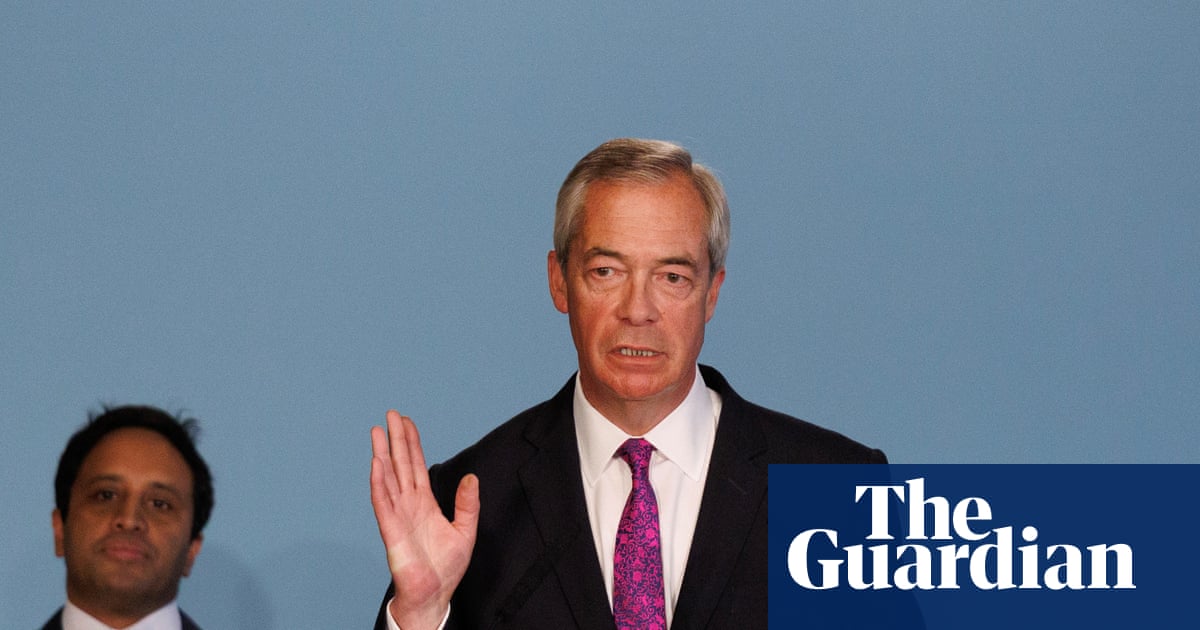At Reform UK’s conference last September,Nigel Faragecould not have been more clear: his party had to “model ourselves on the Liberal Democrats” and painstakingly build an election-winning machine. This was always a tough ask and with Zia Yusuf gone it becomes harder still.
At the time of the speech in Birmingham, Yusuf had been Reform’s chair for slightly over two months, and Farage was at pains to praise the millionaire entrepreneur for having “already made a massive difference to our level of professionalisation”.
While the catalyst forYusuf’s sudden resignationappears to have been his disquiet over some Reform MPs pushing to ban the burqa, there had long been rumours of tensions as the businessman tried to get an organisational grip on the party.
Rightwing populists and political mavericks seem to be falling out regularly at the moment. On the same day Yusuf departed, Donald Trump and Elon Musk’s faltering bromance ignited into a stream ofsocial media insults and threats. Farage’s various political parties have been similarly characterised by a chorus line of jettisoned ex-allies.
So while Thursday’s drama was in some ways nothing new, its repercussions potentially go quite a lot further given Farage’s very clear ambition to finally take one of his political vehicles to a bigger stage.
Much like Reform, Ukip and the Brexit party both enjoyed sweeping electoral successes, but these were largely based on particular issues of the day, a desire to kick the major parties and Farage’s own genius for communication. As such, the triumphs tended to be brief and the moment Farage stepped away thingsfell apart.
Yusuf’s job, as set out by Farage in his speech, was to build a network of volunteer-driven branches nationally, which over several election cycles would gradually build up a mass of councillors, creating enough door-knockers to,in the Lib Dem tradition, bombard voters with leaflets at every election. The idea was to build a party not just reliant on the charisma of one person.
Last month’s local elections were akey first stepas Reform took control of 10 councils across England, even if this was seemingly done in the main using paid-for literature, with Farage’s “people’s army” of volunteers reportedly still thin on the ground.
But within weeks of this landmark have come two reverses. On the same day Yusuf quit, Nathaniel Fried, brought in to work alongside Yusuf in Reform’s Elon Musk-style “department of government efficiency” (Doge) unit, also announced he was leaving.
Just three days earlier, the unithad been unveiledwith some fanfare on Reform’s social media, pictured at Kent council’s offices, with Yusuf saying potentially wasteful spending had already been uncovered.
Alongside the then chair and Fried, the third “Doge” member pictured was Arron Banks, previously a major donor to Farage’s parties who had largely quit the political scene before standing as a Reform mayoralty candidate last month.
Banks is now being talked about as a potential replacement for Yusuf, and while he is also a wealthy entrepreneur, his appointment could be viewed as a step backward, or at least into the past.
A vocal and sometimes abrasive presence on X, Banks is a throwback to the less disciplined and more freewheeling Farage age, one of the self-described “bad boys of Brexit”. It is not as easy to imagine him knuckling down to a regime of branch organisation and candidate vetting.
Other rumours suggest Farage could play it more safe with the chair role, either handing it to Richard Tice, his deputy, or David Bull, the TV presenter who delights Reform conferences with his energetic warm-up routine. But whatever happens, Yusuf is a loss in another way.
As Farage seeks to build Reform into a party whose support can be counted in the 30s of per cent rather than the 10s or even 20s, he has to make it palatable to a wider base – hence his vehement disavowal of the anti-Islam agitator Tommy Robinson and, to an extent,the departure ofthe party’s main culture warrior, the MP Rupert Lowe.
Put bluntly, having a young man of Muslim heritage whose parents came to the UK as immigrants as the party chair could have been viewed as a sign that Reform was aiming itself beyond voters who enjoyed Lowe’stalk of mass deportations. The fact Yusuf quit after a row about burqas delivers a very different message.
